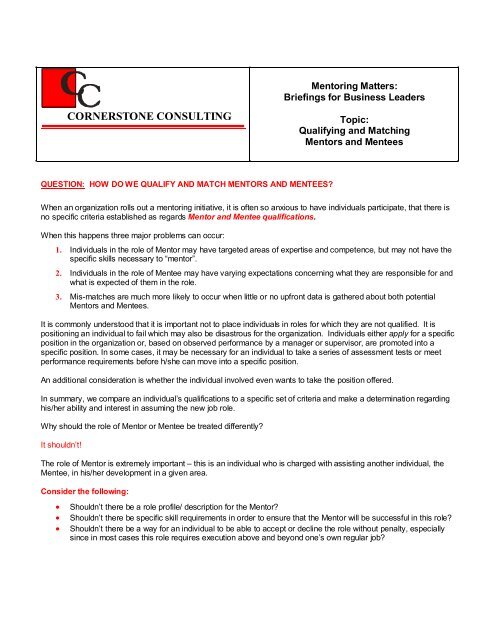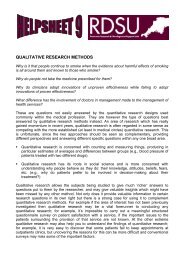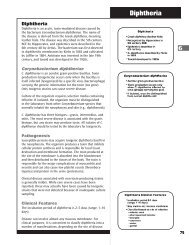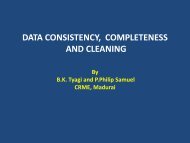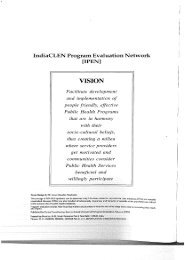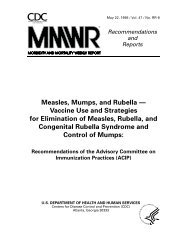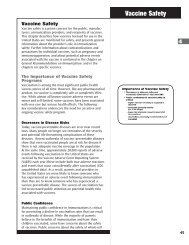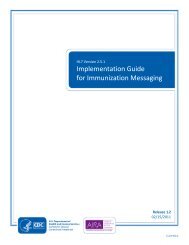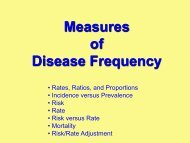Qualifying and Matching Mentors and Mentees - The INCLEN Trust
Qualifying and Matching Mentors and Mentees - The INCLEN Trust
Qualifying and Matching Mentors and Mentees - The INCLEN Trust
- No tags were found...
You also want an ePaper? Increase the reach of your titles
YUMPU automatically turns print PDFs into web optimized ePapers that Google loves.
CORNERSTONE CONSULTINGMentoring Matters:Briefings for Business LeadersTopic:<strong>Qualifying</strong> <strong>and</strong> <strong>Matching</strong><strong>Mentors</strong> <strong>and</strong> <strong>Mentees</strong>QUESTION: HOW DO WE QUALIFY AND MATCH MENTORS AND MENTEES?When an organization rolls out a mentoring initiative, it is often so anxious to have individuals participate, that there isno specific criteria established as regards Mentor <strong>and</strong> Mentee qualifications.When this happens three major problems can occur:1. Individuals in the role of Mentor may have targeted areas of expertise <strong>and</strong> competence, but may not have thespecific skills necessary to “mentor”.2. Individuals in the role of Mentee may have varying expectations concerning what they are responsible for <strong>and</strong>what is expected of them in the role.3. Mis-matches are much more likely to occur when little or no upfront data is gathered about both potential<strong>Mentors</strong> <strong>and</strong> <strong>Mentees</strong>.It is commonly understood that it is important not to place individuals in roles for which they are not qualified. It ispositioning an individual to fail which may also be disastrous for the organization. Individuals either apply for a specificposition in the organization or, based on observed performance by a manager or supervisor, are promoted into aspecific position. In some cases, it may be necessary for an individual to take a series of assessment tests or meetperformance requirements before h/she can move into a specific position.An additional consideration is whether the individual involved even wants to take the position offered.In summary, we compare an individual’s qualifications to a specific set of criteria <strong>and</strong> make a determination regardinghis/her ability <strong>and</strong> interest in assuming the new job role.Why should the role of Mentor or Mentee be treated differently?It shouldn’t!<strong>The</strong> role of Mentor is extremely important – this is an individual who is charged with assisting another individual, theMentee, in his/her development in a given area.Consider the following:Shouldn’t there be a role profile/ description for the Mentor?Shouldn’t there be specific skill requirements in order to ensure that the Mentor will be successful in this role?Shouldn’t there be a way for an individual to be able to accept or decline the role without penalty, especiallysince in most cases this role requires execution above <strong>and</strong> beyond one’s own regular job?
Yes, there should!<strong>The</strong> same is true for the Mentee.…probably not.Should it be assumed that this is an ideal way for someone to learn?Should it be assumed that this is a role that someone would love to have?Should it be assumed an individual underst<strong>and</strong>s what is expected from him/her in this role?Should it be assumed that an individual has the skills or the desire to participate in such a role?THE SOLUTIONMake sure that you have a role profile that specifically outlines the tasks <strong>and</strong> responsibilities of each role <strong>and</strong> the skillsrequired to carry out the role.BUSINESS ISSUE: WE HAVE A MENTORING INITIATIVE IN PLACE NOW, BUT HOW CAN WE MAKE IT MORESUCCESSFUL?Three important elements come to mind.1. Make sure you have specified criteria outlined for both the roles of Mentor <strong>and</strong> Mentee.2. Make sure you select <strong>and</strong> qualify your <strong>Mentors</strong> <strong>and</strong> <strong>Mentees</strong> based on this criteria.3. Make sure that you have a way to accurately assess the expertise of the <strong>Mentors</strong> <strong>and</strong> the needs of theMentee that will lead to a good matching <strong>and</strong> pairing combination.<strong>The</strong> success of an organization’s mentoring initiative is highly dependent on the quality of the <strong>Mentors</strong> <strong>and</strong><strong>Mentees</strong>! Don’t shortchange this step!Without criteria to select <strong>and</strong> qualify <strong>Mentors</strong> an organization has no way of knowing if bad habits or misinformation isbeing passed on, communicated or modeled by these <strong>Mentors</strong>. It is much harder to “un-learn” or “un-teach” bad habitsthat have already been instilled.For a Mentee, choosing a Mentor because h/she is someone you like <strong>and</strong> get along with, may not always be the bestcriteria. <strong>The</strong> main focus of a mentoring relationship should be development. Whether this is focused on a specificskill/competency, an organizational knowledge area or networking <strong>and</strong> career pathing – development should beforemost.All individuals – even adults – when they learn a new skill or any knowledge area learn in Phases or Levels.In simple terms, in Level 1 learning, an individual learns the “basics” of a particular skill or knowledge area <strong>and</strong> this iswhere he/she also usually needs specific help, guidance <strong>and</strong> support to reinforce in practice what is learned <strong>and</strong> toensure that he/she is learning the new skill or knowledge area correctly the first time.During the achievement of Level 2 learning, the individual needs less help, guidance <strong>and</strong> support <strong>and</strong> begins to putwhat he/she has learned into more multifaceted situations.In demonstrating achievement of Level 3 learning, this individual that is considered the subject-matter-expert in thisskill or knowledge area.Mis-matches may occur, when there is not a specific way in which to determine a Mentor’s specific level of expertisein a given skill or knowledge area <strong>and</strong> a Mentee’s specific level of need.In mentoring relationships, there is a tendency to match a Mentee that is presently at Level 1 learning with a Mentorthat is an Expert – or at Level 3 learning. <strong>The</strong> gap between these individuals is too large <strong>and</strong> many times confusingfor both parties. <strong>The</strong> Mentor may use examples or terminology that the Mentee neither familiar with nor can associatewith. <strong>The</strong> Mentee may feel intimidated in asking what could be interpreted as “stupid questions” to an expert.
<strong>The</strong> goal is to match <strong>Mentees</strong> presently at a Level 1 with <strong>Mentors</strong> presently at a Level 2; <strong>and</strong> <strong>Mentees</strong> presently at aLevel 2 with <strong>Mentors</strong> presently at a Level 3. Other than much clearer communication <strong>and</strong> learning, an additionaladvantage is that the <strong>Mentors</strong> presently at Level 2 or 3 have much more empathy for the <strong>Mentees</strong> presently at Level 1or 2 because there is a much more close association as to how it feels to be in that situation.Questions or feedback - please contact us:Cornerstone Consulting6650 Sunset Way #503St. Pete Beach FL 33706-2178727.480.0718www.cornerstone-consults.com


